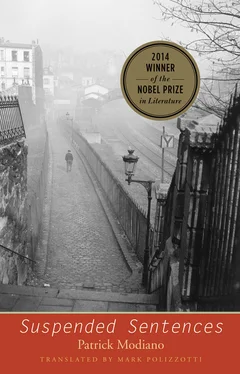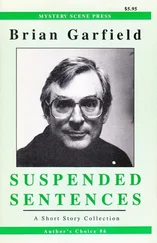Among the photos, on a sheet of letter paper, I had discovered some notes in Jansen’s hand, titled “Natural Light.” It was for an article that a film journal had requested, since he’d worked pro bono as a technical adviser to several young directors in the early sixties, teaching them how to use floodlights like American newsreel cameramen during the war. Why had those notes impressed me so deeply at the time? Since then, I’ve come to realize how hard it is to find what Jansen called “natural light.”
He had told me that he shredded street posters himself to uncover the ones hidden beneath the newer strata. He pulled the strips down layer by layer and photographed them meticulously, stage by stage, down to the last scraps of paper that remained on the billboard or stone wall.
I had numbered the photos in chronological order:
325. Fence on Rue des Envierges
326. Wall, Rue Gasnier-Guy
327. Steps on Rue Lauzin
328. Passerelle de la Mare
329. Garage on Rue Janssen
330. Site of the old cedar tree at the corner of Rue Alphonse-Daudet and Rue Leneveux
331. Slope of Rue Westermann
332. Colette, Rue de l’Aude
I drew up a list of individuals whose portraits Jansen had taken. He had approached them at random, in the street, in cafés, while taking a walk.
My walk, today, took me as far as the Orangerie in the Jardins du Luxembourg. I crossed the shaded area under the chestnut trees, near the tennis courts. I stopped at the bowling ground. Several men were playing a match. My attention was caught by the tallest of them, who was wearing a white shirt. One of Jansen’s pictures came to mind, on the back of which was written a caption that I’d copied onto my list: Michel L., Quai de Passy. Date unknown . A young man in a white shirt resting his elbow on a marble mantelpiece in very bright light.
Jansen clearly recalled the circumstances surrounding that photo. He was broke, and Robert Capa, who had connections, found him an easy, well-paying assignment. He had to go to an American woman’s home on the Quai de Passy, with all the necessary equipment for studio portraits.
Jansen had been surprised by the size and luxuriousness of the apartment, the multiple balconies. The American woman was around fifty, still dazzling, but old enough to be her young French companion’s mother. He was the one Jansen was there to photograph. The American woman wanted several photos of this “Michel L.,” in the style of Hollywood headshots. Jansen had set up the spotlights as if he were accustomed to this type of work. And for six months he’d lived off the money he’d earned from those photos of “Michel L.”
The more I watched the man preparing to toss his ball, the more I was sure I recognized “Michel L.” What had struck me about the picture were the eyes, close to the surface and slanted toward the temples, which gave “Michel L.” a strange look, as if he had compound eyes with an abnormally wide angle of vision. And the man before me had the same slanted eyes and profile as “Michel L.” The white shirt only accentuated the resemblance, despite his gray hair and pasty skin.
The playing ground was surrounded by a metal edging, and I didn’t dare cross that boundary and disturb the game. There was more than forty years’ distance between the “Michel L.” whom Jansen had photographed and the bowls player today.
He walked to the edging while one of his friends pitched the ball. He stood with his back to me.
“Pardon me …”
My voice was so blank that he didn’t hear.
“Pardon me … There’s something I’d like to ask you.”
This time I had spoken much more clearly, articulating each syllable. He turned around. I planted myself firmly in front of him.
“Did you ever know the photographer Francis Jansen?”
His strange eyes seemed to stare at something off on the horizon.
“How’s that?”
“I wanted to know if you ever had your picture taken by the photographer Francis Jansen.”
But a short distance away, an argument had broken out among the others. One of them came toward us.
“Lemoine, it’s up to you now.”
Suddenly it was as if he was looking past me, or right through me. Nonetheless, he said, “I’m sorry … I have to go bowl …”
He got into position and pitched the ball. The others cheered. They crowded around him. I didn’t understand how the game worked, but I think he’d won the match. In any case, he had completely forgotten about me.
These days, I regret not having kept any photos from the suitcases. Jansen wouldn’t even have noticed. Moreover, if I’d asked, I’m sure he would have given me as many as I wanted.
And besides, you never think at the time to ask the questions that will elicit confidences. And so, out of discretion, I avoided bringing up Colette Laurent. I regret that too.
The only photo I kept was in fact one of her. I hadn’t yet remembered that I’d met her a dozen years earlier, but her face must have reminded me of something.
The photo is captioned Colette, 12 Hameau du Danube . When daylight lasts until 10 P.M. because of the time change, and the traffic noise has died down, I have the illusion that all I’d need do is return to those faraway neighborhoods to find the people I’ve lost, who had never left: Hameau du Danube, the Poterne des Peupliers, or Rue du Bois-des-Caures. Colette is leaning against the front door of a private townhouse, hands in the pockets of her raincoat. Every time I look at that picture, it hurts. It’s like in the morning when you try to recall your dream from the night before, but all that’s left are scraps that dissolve before you can put them together. I knew that woman in another life and I’m doing my best to remember. Maybe someday I’ll manage to break through that layer of silence and amnesia.
Jansen came to the studio less and less often. At around seven in the evening, he would call:
“Hello … Is that you, Scribe?”
That was the nickname he’d given me. He asked if anyone had come to the door and if he could stop by without fear of intruders. I reassured him. Just a phone call from the Meyendorffs this afternoon. No, no sign of Nicole.
“Okay, Scribe, then I’ll be right over. See you in a bit.”
Sometimes he’d call back half an hour later:
“Are you sure Nicole’s not around? Is it really safe to come over?”
I had stopped working and waited for him a little longer. But he never showed up. So then I left the studio. I walked down Rue Froidevaux, skirting the cemetery. That month, the trees had regrown their leaves and I was afraid Nicole was hiding behind one of them, lying in wait for Jansen to return home. If she saw me, she’d come up and ask where he was. She might also be lurking on the corner of one of the little streets that spilled onto the left-hand sidewalk and could follow me at a distance in hopes that I’d lead her to him. Back then, because of what Jansen said, I considered Nicole a threat.
One afternoon, she came to the studio when Jansen was out and on an impulse I answered the door. It bothered me, always having to tell her over the phone that Jansen wasn’t there.
When she saw me in the half-open doorway, an expression of startled anxiety flashed in her eyes. Perhaps she thought Jansen had left for good and a new tenant was now living there.
I quickly reassured her. Yes, I was the one who answered the phone. Yes, I was a friend of Francis’s.
I invited her in and we both took a seat, she on the sofa and I in an armchair. She had noticed the two notebooks, the large register, the open suitcases and piles of photographs. She asked if I was working for Francis.
Читать дальше












